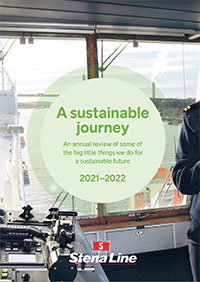Sustainability
Our commitment to sustainability centres around six of the UN Sustainable Development Goals. For each of these, we have defined ambitious long- and short-term targets.
Affordable and clean energy
We work to improve energy efficiency on shore and at sea and stimulate the use of clean energy resources. Our transport emissions per tonne-nautical mile continued to fall, due to more efficient cargo utilisation. Because we travelled further than in 2020, inevitably our total CO2 emissions were higher, but still lower than they were pre-COVID in 2019. 100% of the electricity used in our shore operations is now renewable and 20% of all terminals offer shore power connections.
Gender equality
In an industry where just 2.7% of seafarers are women, we create opportunities for greater gender equality in our industry, supporting women to access leadership roles across all areas of our business. In 2021, we achieved our previous target of 30% women in our Group Management team and are now working towards a target of 30% female leaders across the business. We appointed our first female captain and rolled out our annual Women in Maritime campaign to encourage more women to go for leadership opportunities.
Reduced inequalities
In 2021, we adopted ‘Reduced inequalities’ as a new focus area for our sustainability work, defined our targets, and appointed a Diversity and Inclusion lead to drive forward progress in this area. By reducing inequalities across the nine dimensions of equality protected under European laws, we want to be a safe, attractive, employer for all, where everyone can thrive.
Good health and well-being
We take responsibility for the health and wellbeing of everyone who comes on board our vessels, enters our ports or terminals, and visits our offices. In 2021, we carried out an employee survey, which identified that nearly all indicators are above average. In addition, we received a positive employee net promoter score, meaning that, overall, our employees would recommend us as a workplace. Our sick leave average fell by 1%, compared with 2020, and we brought new focus on employee safety.
Responsible consumption and production
We aim to reduce waste and increase recycling, while driving responsible procurement based on care for resources. In 2021, we achieved our best-ever recycling rates of 42% of all waste. However, due to COVID-19 safety measure, we saw an increase in the use of single-use plastic on board our vessels. We want to get back on track with our target of phasing it out across our fleets in 2022.
Life below water
We are committed to safeguarding the oceans and minimising our impact on marine life. In 2021, we renewed our ISO 14001:2015 certification, which is an important tool in helping us prevent pollution. There is more work to be done in the area of oil spills as the number of spills increased compared to 2020. However, the amount of oil spilled was lower, showing that procedures are in place to detect spills and prevent further impact.
Read more about our sustainable journey

A sustainable journey 2021/22
(22.6MB)Read about many of the big little things we do for a sustainable future.